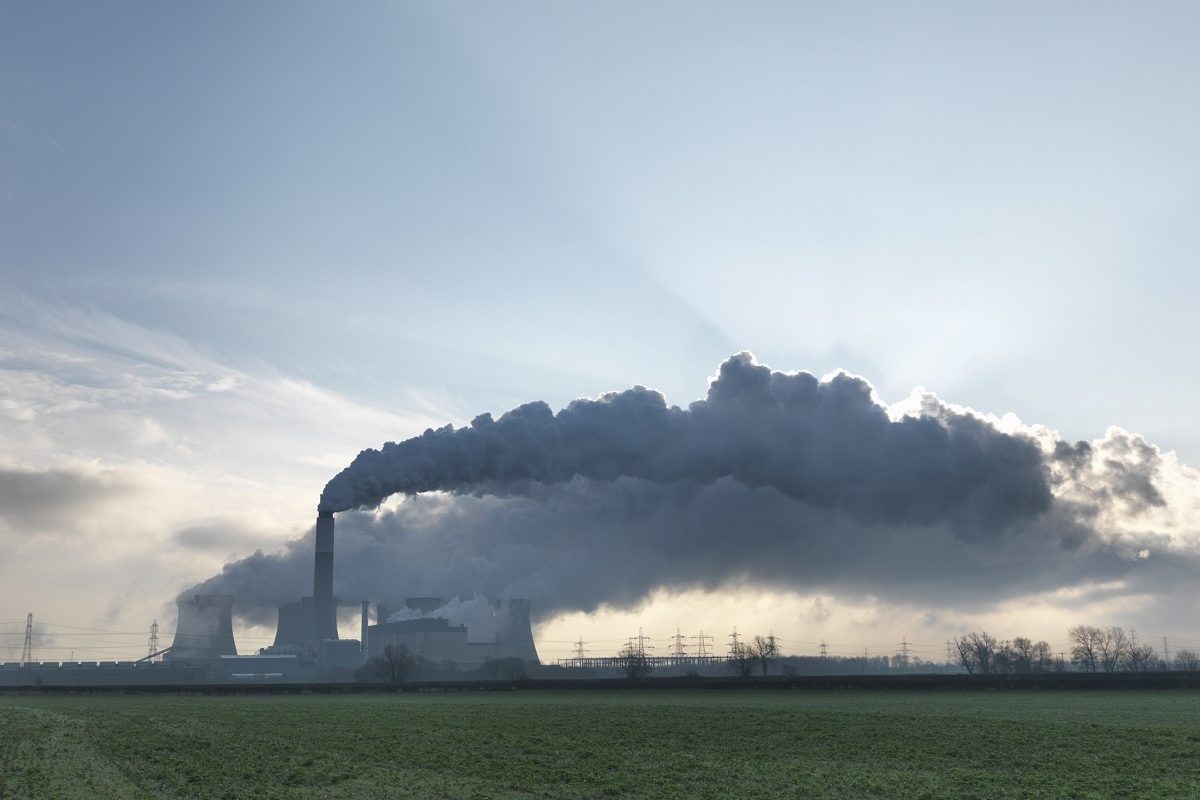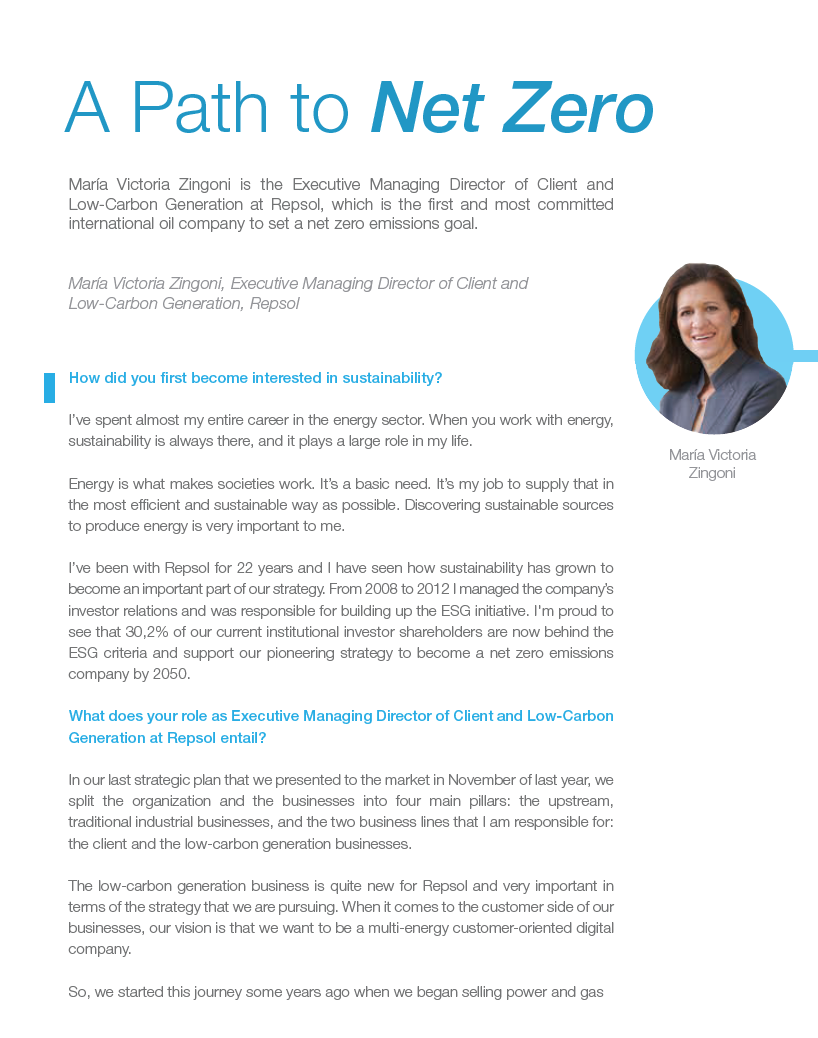
"Decarbonization is a Business Opportunity to be Maximized"
María Victoria Zingoni, Executive Managing Director at Spanish energy giant Repsol, told Nomura Greentech that the company is transforming its business by adding solar and wind farms to become net-zero by 2050.
- Repsol is devoting almost 40% of CapEx in the next five years to low carbon.
- Company has set intermediate targets to reduce carbon emissions by 25% by 2030 on the path to net zero
- Zingoni sees potential for renewable hydrogen and advanced biofuels to decarbonize heavy industry and transportation sectors like maritime and aviation.
"How did you first become interested in sustainability?"
I’ve spent almost my entire career in the energy sector.
Energy is what makes societies work. It’s a basic need. It’s my job to supply that in the most efficient and sustainable way possible.
I’ve been with Repsol for 22 years and I have seen how sustainability has grown to become an important part of our strategy. From 2008 to 2012 I managed the company’s investor relations and was responsible for building up the ESG initiative. I'm proud to see that 30.2% of our institutional investor shareholders are now behind the ESG criteria and support our pioneering strategy to become a net zero emissions company by 2050.
"What does your role as Executive Managing Director of Client and Low-Carbon Generation at Repsol entail?"
In our last strategic plan that we presented to the market last November, we split the organization and the businesses into four main pillars: the upstream, traditional industrial businesses, and the two business lines that I am responsible for: the client and the low-carbon generation businesses.
The low-carbon generation business is quite new for Repsol and very important in terms of the strategy that we are pursuing. When it comes to the customer side of our businesses, our vision is to be a multi-energy customer-oriented digital company.
So, we started this journey some years ago when we began selling power and gas to the end customer. The way that we see it, the end customer needs different types of energy across the day, seasons, and usages. Therefore, we are creating smart, personalized energy solutions that are tailored to meet those needs of each individual customer. This includes not only electric mobility solutions, but also future synthetic fuels as well as power and gas for homes and businesses. Not only that, but also the smart energy solutions that allow our customers to benefit from distributed generation solutions like the ones that we have for rooftops or as part of solar communities.
The idea is to put the customers in the center and provide all the energy they require in the most sustainable way. It is important to help the customers in the energy transition. They need to take part in the journey as well. As part of this approach, we are the first company in Spain to offer CO2 emissions compensation at our service stations; the only big Spanish retail company with an “A Label” that certifies the renewable origin of the power we supply; and we have just launched the so called “Your Power Origin” solution where a customer can choose a solar or a wind farm as a “personal supplier” and based on a digital tool we provide ideas about energy efficiency linked to that particular generation mode. For example, if your solar panel is generating power, this is the right moment to use the washing machine.
For the low-carbon generation business line that I am responsible for at Repsol, doing that is also part of our future. We have made a commitment to grow these parts of the business. Our goal is to have 15 GW of low-carbon generation by 2030, half of it by the middle of the decade. Repsol is developing a very solid portfolio of renewables assets in Spain. At the end of last year, we started our first wind farm in Spain with 335 MW, and we recently started our first solar farm, also in Spain. With some capacity already producing in Chile and projects under construction and development in both countries, we are advancing at a good pace.
"How does Repsol set its sustainability objectives?"
We start with our belief that sustainability and the energy transition are a business opportunity. We have long viewed decarbonization as a business opportunity whose merits should be maximized.
Once you understand sustainability as a financial and business-oriented model as well as an environmental one, you can develop efficiency and circular economy initiatives that address the largest issue that we have right now: the decarbonization of the economy as a whole.
Repsol has a long track record on such thinking. This is not new for us. We were not only the first traditional oil and gas company to set a net zero emissions goal, but also the first one to support the Kyoto Protocol almost 20 years ago when we created our first climate unit back in 2003. We launched our first carbon plan back in 2005, and the first emissions reduction plan in this company was in 2006. We are comfortable with the track record that we have, and also in setting the strategy around that.
We issued the industry's first green bond in 2017. In our new strategic plan, we are dedicating a significant portion of our CapEx to low carbon growth so almost 40% of the total CapEx in the next five years will be devoted to low carbon.
At Repsol, since 2006 we have reduced CO2 emissions by more than 5.5 million tons, and we are accelerating our efforts.
Last year we reduced the carbon intensity indicator by 5% in comparison to 2016. And this year in 2021, we have the target to do an additional 3%. Continuing to lower CO2 emissions is our most important commitment.
We are applying the best-in-class digitalization technologies and data analytics to do so and are setting an internal carbon price to make decisions and to stay on track.
Repsol maintains an open and constant dialogue with the ESG investor universe, which is really important. We are adapting to the constant changes in energy usage and consumer habits. It's important to understand what the customers want and how they are going to be part of this energy transition journey.
"Repsol set a 2050 goal to attain net-zero emissions. What strategies are in place to achieve that goal?"
We are on track. As an integrated multi-energy company Repsol is very well positioned to lead the energy transition. Not only because we are significantly funding our new renewable portfolio assets, but, also, because we are very committed to develop and transform our current core businesses to support our sustainability goals.
I am a firm believer in technological neutrality to boost the energy transition. We cannot foresee the future and we need to consider all the energy sources and technological developments ahead to achieve success in the fight against climate change.
We need all types of energy to be more sustainable. That is how Repsol likes to think about it. All forms of decarbonization, in the way that we see it, are valid and complimentary, so we need to incentivize them so that all forms of energy can contribute, without exception. That is what is going to help us as a society as a whole to accelerate the progress of the energy transition. The challenge is to commit to those energies that contribute to reaching our goals in the most cost effective way.
Repsol is tracking its progress to facilitate the net zero targets that we have by 2050. In our strategic plan, in comparison to other companies, we have a long-term goal, but we have also set intermediate targets for reducing carbon emissions.
We are aiming for a 12% reduction by 2025, 25% by 2030, and 50% by 2040 to be able to reach zero net emissions in 2050. At this moment, we believe that it is possible to achieve at least 80% of that ambitious target with the technology that we can currently foresee.
Technology is continuing to evolve, not least with respect to carbon capture, use, and storage. And if that is not enough, we will apply alternatives to offset the rest of the emissions.
Being in 2021 and having a net zero target almost 30 years from now and knowing how to achieve 80% of it says a lot about our strategy. We truly believe that we will achieve it.
When we talk about net zero, it is an absolute commitment, and we want to get there as quickly as possible.
"As a diversified energy distributor, how do you see Repsol should be positioned in 10 years’ time?"
I’d like Repsol to be considered by our customers and shareholders as a sustainable multi-energy company with a diverse and personalized offering of products and services. When I say multi-energy, I mean energy for the home, for enterprises, and for mobility. We understand that customers are going to be more and more conscious about the energy they consume and how it is produced. And I see Repsol playing an integrated role across the whole value chain.
Electrification will, no doubt, play an important role in the energy transition, but renewable energy and electrification alone will not be enough to decarbonize the economy as a whole. There are still large heavy industrial sectors and chunks of transportation: long haul, maritime, aviation, etc. that need other solutions.
I see a lot of potential for renewable hydrogen, advanced biofuels, and synthetic fuels. I hope to see those technologies pick up speed in the next five to 10 years.
Download a PDF of the full whitepaper
Disclaimer
This content has been prepared by Nomura solely for information purposes, and is not an offer to buy or sell or provide (as the case may be) or a solicitation of an offer to buy or sell or enter into any agreement with respect to any security, product, service (including but not limited to investment advisory services) or investment. The opinions expressed in the content do not constitute investment advice and independent advice should be sought where appropriate.The content contains general information only and does not take into account the individual objectives, financial situation or needs of a person. All information, opinions and estimates expressed in the content are current as of the date of publication, are subject to change without notice, and may become outdated over time. To the extent that any materials or investment services on or referred to in the content are construed to be regulated activities under the local laws of any jurisdiction and are made available to persons resident in such jurisdiction, they shall only be made available through appropriately licenced Nomura entities in that jurisdiction or otherwise through Nomura entities that are exempt from applicable licensing and regulatory requirements in that jurisdiction. For more information please go to https://www.nomuraholdings.com/policy/terms.html.




